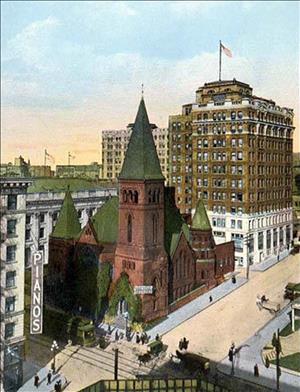On July 2, 1909, suffragists Caroline Lexow, Eva Emery Dye, and Frances S. Potter (1867-1914) speak to the crowd at the second evening meeting of National American Woman Suffrage Association convention at Plymouth Congregational Church in Seattle. The theme of the evening is suffrage on college campuses. The convention is taking place during Washington's first world's fair, the Alaska-Yukon-Pacific (A-Y-P) Exposition, held on the University of Washington campus. The confluence of the widely publicized convention and the world's fair will help win supporters for women's right to vote.
Reverend Anna Howard Shaw (1847-1919) presided. Reverend W. H. W. Rees of Seattle First Methodist Church delivered the invocation. Marie Bishop played a violin solo. Members of the Washington College Equal Suffrage Association, dressed in black academic gowns and mortar boards, served as ushers.
The Most Brilliant Session
The History of Woman Suffrage, Volume V states:
"The most brilliant session of the convention probably was that of the College Women's Evening, with Dr. Shaw presiding. Miss Caroline Lexow (N.Y.) secretary of the College Women's League, spoke of its remarkable growth since its organization the preceding year and said that it now had twenty-four branches in as many states and twenty-five chapters in as many colleges. She called attention to the fact that no College Anti-Suffrage Association had ever been formed and said that college women remembered the words of the pioneers: 'Make the best use you can of your freedom for we have bought it at a great price'" (p. 255).
Oregonian Eva Emory Dye spoke on College Women in Civic Life. Seattle attorney and journalist Adella M. Parker, who was the president of the Washington College League, addressed the topic of The Law and Women. Francis Squire Potter, an English professor from the University of Minnesota, described the relationship between college women and modern life.
Every Law
The Seattle Post-Intelligencer quoted Adella M. Parker's remarks:
"Every law from the tariff on gloves to the declaration of war has some effect on some women. The great social activities are controlled by political forces, and the problems that confront humanity need the solving genius of women as well as of men. The law needs the voice of the woman as much as the woman needs the voice in the law" ("Bolting Suffragists ...").
The article went on to quote Frances Squire Potter:
"A mother may send her daughter to a co-educational institution; she may send her to a convent; she may send her into the industrial world, or she may keep her tied to her apron strings; but she cannot keep her from facing the great industrial problems of life.
"I do not know a woman who has spent a moment of her life to the betterment of her children who is not a suffragist.
"The time has come when college women can no longer remain noncommittal on the subject of suffrage. College women would command respect by rising in a body and demanding suffrage."
The Ballot Swiftly Gained
Later the same week J. R. Rogers, a woman identified by the Seattle Post-Intelligencer as having been "since its inception identified with the work of the College Suffrage League" told the newspaper:
"No women have better reason for confident belief in the results of their endeavors than have college-bred women. Among the delegates to this council were those who could well remember the efforts needed to found or obtain entrance to any educational institution of a higher grade than a young ladies' finishing school. Side by side with these were younger delegates to whom the doors and degrees of almost every university in the country are open. That these women will not be as swift as they were in their educational stride in gaining for themselves and other women the ballots they now demand it would be dangerous to predict" ("Suffrage Work In The College Leagues").
On July 7, 1909, the Seattle Post-Intelligencer announced that Frances Squire Potter had resigned her university post to work full time for the National association as national corresponding secretary. She was moving to New York City to be in charge of headquarters there.

